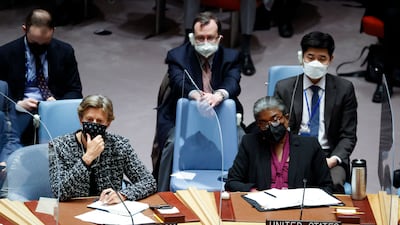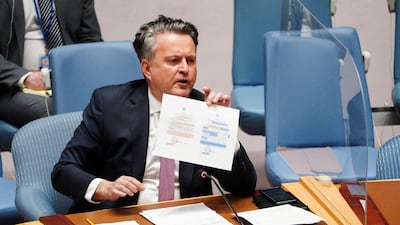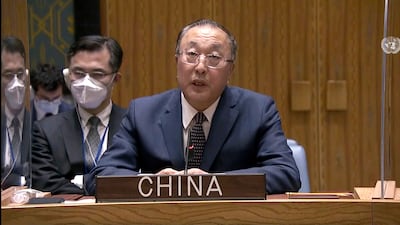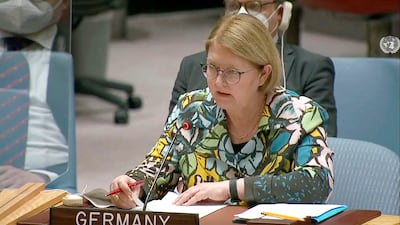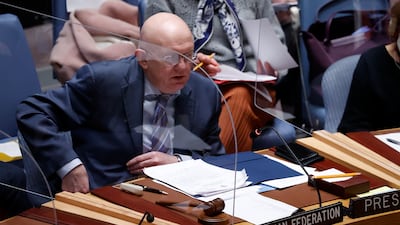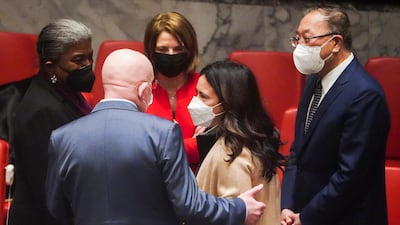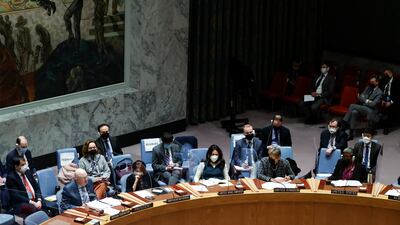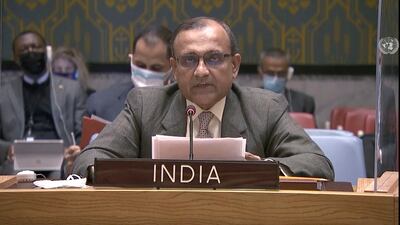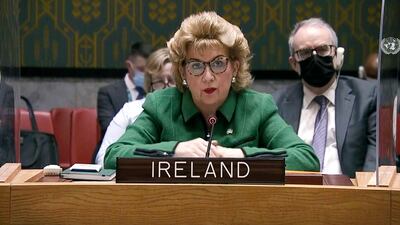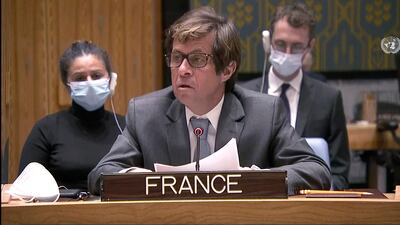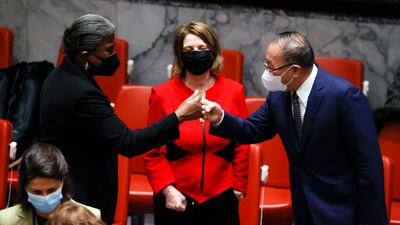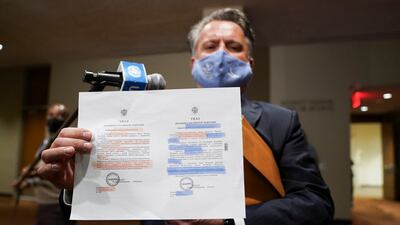Seventy-seven years after its founding, the UN Security Council no longer works, Canada’s ambassador to the UN Bob Rae told The National.
The deeply divided council struggles to act on today’s most pressing international crises and when it does, it often fails.
The world, therefore, must come to terms with the reality that the UN’s most powerful organ is “dysfunctional”, he said.
He laid the blame for that ineffectiveness on the existence of the veto power.
From the beginning, the veto has been a steady source of tension between the wider membership of the UN and the five permanent Security Council members — the US, the UK, France, Russia and China. Though five countries are chosen to hold rotating memberships every year, none have the veto power.
“If you’ve got two permanent members with vetoes … there's no way they're going to allow for an effective resolution to come out,” Mr Rae said.
“I don't like any country having a veto. Canada has concluded that the use of the veto is being abused, and that it would be better in a multilateral system if no country had a veto.”
UN Security Council meeting on Ukraine crisis — in pictures
And any expansion of the veto power would be a “terrible thing”, he added.
With alliances clearly drawn on the council — Russia and China against the US, the UK and France — it is naive to expect the body to achieve “great things”.
Russia is not a constructive player on the council, he said: as emigration, war and a plunging birth rate wreak havoc on its demographics, as its economy continues to circle the drain and as its invasion of Ukraine drags on, Moscow is determined to continue playing a disruptive role in the UN system.
“I think President [Vladimir] Putin's ideas are dangerous,” he said. “His inability to recognise the independence of Ukraine and his refusal to accept the fact that Ukraine is a separate country whose sovereignty is as important as his own sovereignty is a real problem.”
With its veto power, Russia has the ability to block any attempt to condemn the invasion of Ukraine.
The inability of the council to successfully address issues such as the invasion of Ukraine has sparked calls for the UN to be reformed and raised questions about whether it can still serve its stated purpose of maintaining international peace and security.
Meanwhile, Canada has concerns over the growing influence of China.
Ottawa has been locked in a diplomatic confrontation with Beijing since the arrest of Huawei executive Meng Wanzhou at Vancouver's airport in 2018. Chinese authorities subsequently incarcerated two Canadian citizens, Michael Kovrig and Michael Spavor.
Mr Rae said that Beijing is trying to reshape the UN system so that it mirrors China’s values and foreign policy goals.
“It's important for China to know there are certain rules,” he said. “One of the key rules is, if you work for the UN, you don't work for your national government.”
Acting otherwise “poses a real challenge to the integrity of the UN system”.
Due to these and other issues, Mr Rae said that the current Security Council format “treats members unequally”.
“It says you're important, you're not important, you're permanent, you're not permanent.”
But Canada’s UN envoy noted that none of the veto-wielding permanent members would ever agree to give up their veto power.
Canada has held a rotating seat on the council six times since the UN was founded in 1945, with the last time being in 1999-2000, but Mr Rae said his country does not “need to be on the Security Council to have influence”.
“The Security Council is not really a highly functional body, so I don't worry about it,” he said.
One of the most pressing issues facing the UN is the situation in Iran, which is supporting Russia in the war in Ukraine as it violently cracks down on anti-government protests at home.
Mr Rae underscored the importance of maintaining sanctions on Iran.
Canada recently imposed fresh sanctions on Iran, marking the fourth package it has announced over alleged human rights abuses in the country.
“We're continuing to deal directly with the question, how do we continue to put pressure on the [Iranian] regime and to isolate them?” he said.
Following efforts by several countries and activists to immediately expel Iran from the UN Commission on the Status of Women, the Canadian Parliament unanimously adopted a motion last month that called for Tehran’s removal from the body.
Iranian women have been at the forefront of protests across the country since 22-year-old Mahsa Amini died in police custody in September. She was arrested after she allegedly failed to comply with Iran's strict dress code for women.
Canada traditionally serves as a lead sponsor of an annual UN General Assembly resolution condemning human rights abuses in Iran. It will present that resolution again later this year, when it is expected to be widely approved.
But Mr Rae said this is unlikely to be enough.
“There's an extremely widespread, comprehensive set of sanctions by a number of countries, but not by Russia, not by China, not by India, not by a number of countries in the region,” he said. “And that's what's limiting the effectiveness of the global community.”
Ultimately, he adds, it will be up to the Iranian people to make a decision as to how they want to go forward.
In an age of mounting scepticism towards global institutions, Mr Rae underscored the importance of strengthening multilateralism in tackling the immense challenges the world faces.
“There is no Canadian answer to climate change. There is no Russian answer to climate change. There's no Chinese answer to the pandemic. There's no American answer to the growing conflicts and migration and displacement that we see in the world,” he said.
There is instead only a “global answer” and a need for “greater solidarity”.
“I think if we successfully pay attention to this, we would have reinforced the original goals of the UN Charter,” he said.
“And if we don't, then I think we'll begin to see a heavy price.”

